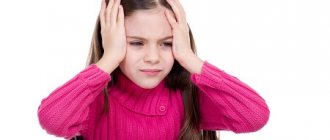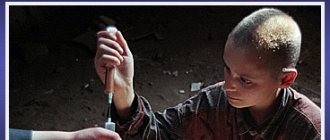Causes of depression
Depression in a child can be caused by:
- family situation (frequent conflicts between parents, lack of parental care or, conversely, overprotection);
- frequent changes of place of residence and school, which leads to the inability to make friends;
- problems at school (underachievement or difficult relationships with peers);
- hormonal changes in the body during adolescence;
- severe stress (loss of loved ones, divorce of parents, traumatic situations).
Causes of depression in children
Depressive conditions in children develop based on provoking factors:
- CNS lesions . Depression develops as a result of damaged brain cells during intrauterine fetal hypoxia and infections, birth asphyxia, neonatal encephalopathy, and severe pathologies.
- Hereditary predisposition. Family members, close and distant relatives may suffer from mental and neurological diseases.
- Family atmosphere. The main reason for the development of depression in childhood is lack of contact with the mother (abandonment of one’s own children, deprivation of parental rights, death of the mother during childbirth). A difficult atmosphere in the family (alcoholism, drug addiction, regular conflicts between spouses, even causing bodily harm to each other) causes the development of a depressive state. Aggressiveness and violence cause children to feel depressed and anxious. In preschool age, children are exposed to depression when communicating with peers in kindergartens, sports and creative sections.
- Upbringing. Childhood depression is often formed due to the negative attitude of parents: the use of violence, cruel upbringing, excessive control over their own child or complete indifference to his life. The emotional state of children worsens over time and leads to the development of depressive disorder.
- Social factors. In general education institutions, children often experience conflicts with peers and teachers, and poor performance due to severe mental overstrain. Over time, emotional imbalance appears, leading to such negative consequences.
Causes of depression also include psychological trauma, emotional stress, impaired cognitive functions in the brain, allergic reactions, and somatic diseases.
Symptoms of depression in children
Depression in a child can be expressed as follows:
- the slightest insult, remark or other insignificant reason leads to tears;
- loss of appetite;
- loss of interest in previously favorite activities, apathy;
- isolation;
- mental and physical inhibition;
- sleep disorders;
- frequent complaints of fatigue and malaise;
- groundless feeling of anxiety and attacks of fear.
Physical manifestations may also occur in the form of gastrointestinal disturbances, difficulty breathing, heart pain, or itchy skin and rashes.
The most dangerous manifestation of depression in a child can be thoughts of suicide. They do not appear at the very beginning of the disease, but after a long time. The child may consider the suicide plan in detail. This phenomenon is most widespread among adolescents.
Treatment of depression in children
Experts use medication and psychotherapy to treat childhood depression. Additionally, special events are carried out to adapt children to social rehabilitation.
Antidepressants and selective serotonin reuptake inhibitors are prescribed as drug therapy After taking antidepressants, results can be seen after 2 to 3 weeks. The drugs have virtually no side effects. After using the medications, there is calmness, absence of discomfort, pain, panic, and fear.
Cognitive-behavioral therapy is carried out by a psychologist who teaches the child to express his own feelings and emotions and provides him with moral support throughout the treatment. The specialist uses special techniques to improve the patient’s mood and behavior. The main goal of this technique is relaxation. Breathing techniques, drawing, and fairy tale therapy are also used.
Family therapy is based on the work of a specialist with a child and his parents. The main goal of the classes is to restore harmonious relationships in the family.
To prevent recurrence of depression in children, it is recommended to follow preventive measures. Parents need to create a favorable and comfortable environment in the family, support the child in any unforeseen situation and participate in his affairs. You should visit specialists to determine an assessment of the child’s emotional state. Self-prescription or withdrawal of drugs is strictly prohibited.
Treatment of childhood depression
It is almost impossible for a child to get out of a depressive state on his own, especially if it lasts long enough and is aggravated by suicidal thoughts. Therefore, the primary task of parents is to seek medical help in a timely manner. An experienced psychiatrist will make the correct diagnosis, help you understand the causes of depression, together with your parents, outline a plan for eliminating them and prescribe treatment. Do not try to treat the disease yourself. An unprofessional approach can aggravate the situation and lead to irreparable consequences.
Symptoms of childhood depression
One of the most important things you can do as a parent is to understand and recognize the symptoms of childhood depression. These symptoms are different from those of a depressed adult. Children react to emotions differently than adults, which can make diagnosis very difficult.
Not all of these symptoms necessarily describe childhood depression, but if you notice that your child has a number of these signs over a long period of time, you may want to see a doctor.
- Deep feeling of sadness
One of the most common symptoms of depression at any age is a deep feeling of sadness, however, children sometimes try to hide their feelings. Often your child may feel very sad, but not show it to others. Children may not be fully aware of the feeling, and if it continues for a long period of time, they may assume that it is normal to feel this way.
- Irritability
Many children with childhood depression seem very irritable. Their feelings of sadness may manifest as irritability or even anger. If it seems to you that your child loses his temper very quickly when doing homework or school work, if he responds to the slightest provocation, or is often irritated by little things, this may be a symptom of childhood depression.
- Sleep changes
Changes in sleep are a prominent symptom of childhood depression. Your child may have insomnia, difficulty falling asleep, or may not be able to sleep much, resulting in extreme tiredness. On the other hand, your child may sleep too much or spend all his free time in bed. It's important to address these issues right away because too much or too little sleep can make other symptoms worse.
- Difficulty concentrating
Some children with depression are misdiagnosed as having attention deficit disorder because they cannot concentrate in school. However, depression itself can cause this lack of concentration. Their deep feelings of sadness and irritability and difficulty sleeping may cause problems with concentration.
- Decline in school performance
If your child's grades used to be good and suddenly or gradually but steadily drop, it's a sign that something is wrong. In childhood depression, this may be due to lack of concentration, lack of motivation to study, or lack of interest in school in general.
- Changes in eating habits
Many children with depression will also have changes in eating habits. Some children may begin to eat much more than usual, others, on the contrary, lose their appetite or eat very little. If you notice that your child's eating habits have suddenly changed, as well as other symptoms of depression, this may be an indicator that you need to seek help.
- Mood swings
Mood swings are also quite common in childhood depression. One minute your child may be laughing at a joke or TV show, and the next minute they may be extremely irritated or crying. This is because many children with depression have moments when they may laugh, smile and joke, but ultimately the feeling of deep sadness never leaves them, and therefore their joy is short-lived.
- Feels worthless
Many children with depression feel worthless. This feeling may become worse as the effects of other symptoms of depression occur, such as poor grades, arguments with friends, and feelings of misunderstanding. It is important that you pay attention to your child's words and actions and remain calm and rational, even if he seems to be very resistant to your care. Low self-esteem is very common among children with depression and is one of the leading causes of childhood suicide.
- Tearfulness
A child, it seems, can cry over mere trifles, without any reason. If you notice that your child is crying a lot and was much more settled before, you should talk to them and try to find out the reason. If other symptoms are also present, you should consider seeking medical help.
- Insulation
Many children will become distant from friends and family. They will spend more and more time alone, sitting in their rooms. They may often walk alone. They reduce time spent with friends, and they may completely abandon old friends without making new ones.
- Lack of interest in practical activities
If your child was actively involved in sports or other extracurricular activities and suddenly stops, this could be a sign of depression. Be sure to try to find out why this happened, if there is no justified reason, such as a change of coach, more schoolwork, or other logical explanations for giving up your favorite hobby, this may be a symptom of depression.
- Decreased energy levels
The child feels constantly tired. He is not as active as before. He becomes more lethargic and loses his cheerfulness.
- Thoughts about death or suicide
One of the most troubling symptoms of childhood depression is thoughts of death or suicide. However, many children may have these thoughts but not voice them. You can suspect something is wrong by the child’s suddenly changed tastes, by what films, books, and musical groups begin to attract him. He may begin to choose darker colors of clothing, and depressive expressions that are unusual for children begin to appear in his speech.
Important All these symptoms are typical, and even normal, for adolescence; you should be wary when they suddenly appear in young children.
Use of medications
Very few drugs are approved for use in children. In any case, the decision about the need for drug therapy and the choice of a specific medication is the responsibility of a qualified specialist. Do not self-medicate under any circumstances!
If your child has any symptoms of childhood depression, you should contact a GP as soon as possible.
It is a fairly common condition and many children suffer from it, and many of these children may harm themselves as a result of lack of adequate support. It is important to get help for your child as early as possible. The information presented in this material is for informational purposes only and does not replace professional advice from a physician.
If you notice symptoms of depression in your child, consult a specialist! Author: Editorial staff of the Help-Point.net portal
Start working with a psychologist right now
Start a consultation
Tags: depression children psychologist consultation online psychologist
Share
Previous article
Consultation with a psychologist
Next article







